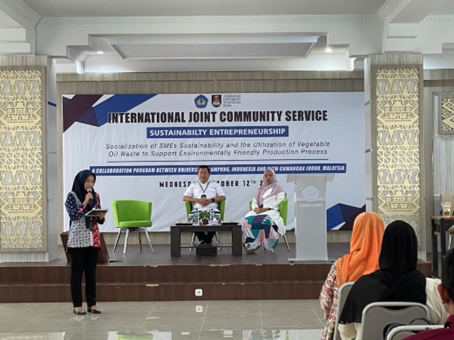SME’s sustainability and the utilization of vegetable oil waste to support environmentally friendly production process
DOI:
https://doi.org/10.22219/jcse.v4i2.25910Keywords:
Business sustainability, Vegetable oil waste, environment, MSMEsAbstract
Community service is a process of self-empowerment for the benefit of society. The community empowerment movement, whatever its form, is part of community service. The problem regarding the large amount of vegetable oil waste for MSME actors both in Indonesia, especially in big cities is getting more complicated. The increasing amount requires immediate handling because it can damage the environment when disposed of carelessly. In this community service activity, the service team involved Micro, Small and Medium Enterprises in Bandar Lampung. In addition, this dedication also involves foreign university partners, namely the MARA University of Technology (UiTM) in its implementation. This service focuses on the utilization of vegetable oil waste that has been used and then used to produce value-added products such as biodiesel. This award will be held from 8 to 14 October 2022. The purpose of holding this service is how to manage used oil waste resulting from the MSME production process. This is because the waste oil produced is often just carelessly disposed of into the surrounding environment which will certainly have a negative impact on environmental sustainability. Later, when it becomes biodiesel, besides being an added economic value, it will also support environmental sustainability by creating an alternative source of renewable energy. The conclusion from this service is that the participants have the knowledge and ability to process waste vegetable oil into biodiesel.
Downloads
References
Abdurrahman, N. H., Rosman, A., & Taib, M. R. (2020). Quantitative assessment of methane emission from palm oil mill effluent (POME) treatment ponds. Journal of Environmental Management, 261, 110194.
Arminah, Nabila Zahra Nur dan Adina Muliawati. (2021). Pengelolaan Sampah dalam Konteks Pembangunan Berkelanjutan (Waste Management in the Context of Waste Management). Universitas Gajah Mada, diakses melalui https://hmgp.geo.ugm.ac.id/2021/08/27/pengelolaan-sampah-dalam-konteks-pembangunan-berkelanjutan-waste-management-in-the-context-of-waste-management/
Askar Jaya. (2004). Konsep Pembangunan Berkelanjutan. Pengantar Falsafah Sains (PPS-702), Program S3 Institut Pertanian Bogor.
Daly, H. (2010). Ecological economics: principles and applications. Island Press.
Damayanti, F., Supriyatin, T., & Supriyatin, T. (2020). Pemanfaatan Limbah Minyak Jelantah sebagai Upaya Peningkatan Kepedulian Masyarakat terhadap Lingkungan. Dinamisia : Jurnal Pengabdian Kepada Masyarakat, 5(1), 161–168. https://doi.org/10.31849/dinamisia.v5i1.4434
Elkington, J. (1999). Cannibals with forks: The triple bottom line of 21st century business. Capstone.
Erna, N., & Wiwit, W. S. (2017). Pengolahan Minyak Goreng Bekas (Jelantah) sebagai Pengganti Bahan Bakar Minyak Tanah (Biofuel) bagi Pedagang Gorengan di Sekitar FMIPA Unnes. Jurnal Rekayasa, 15(2), 89–94
Evy S., dan Fatmir Edwar. (2012). Teknologi Pengolahan Biodiesel dari Minyak Goreng Bekas dengan Teknik Mikrofiltrasi dan Transesterifikasi sebagai Alternatif Bahan Bakar Mesin Diesel. Jurnal Riset Industri, (VI)2
Ginting, D., Wirman, S. P., Fitri, Y., Fitrya, N., Retnawaty, S. F., & Febriani, N.(2020). PKM Pembuatan Sabun Batang dari Limbah Minyak jelantah bagi IRT Kelurahan Muara Fajar Kota Pekanbaru. Jurnal Pengabdian Untuk Mu Negeri,4(1), 74-77
Halid S. Ahmad; Nurhayati Bialangi dan Yusdza K. Salimi. (2016). Pengolahan Minyak Jelantah Menjadi Biodiesel. Jurnal Entropi (11)2
Hawken, P. (2017). Drawdown: The most comprehensive plan ever proposed to reverse global warming. Penguin Books.
Pratiwi, I. S., Budihardjo, M., & Masruri, M. R. (2019). Analysis of wastewater treatment from tofu and tempe industry using activated sludge method. Journal of Physics: Conference Series, 1167(1), 012029.
Puspitasari, L., Rofiq, M., & Adyati, D. (2019). Implementasi program zero waste pada industri minyak kelapa sawit skala kecil. Jurnal Ilmu Lingkungan, 17(2), 67-76.
Rockström, J., et al. (2015). Planetary boundaries: A safe operating space for humanity. Science, 347(6223), 1259855.
Ruhyat, N., Firdaus A. (2006). Analisis Pemilihan Bahan Baku Biodiesel di DKI Jakarta. Universitas Mercu Buana, Jakarta.
Sachs, J. (2015). The age of sustainable development. Columbia University Press.
Selly P.D.,, Fadila M,., Nurdesri Juni A., Prasetyo M., M Bagus J., Della Y., Desvi R.,Mega Tasya P., Muhamad Rizky S., Ria Angelina S.,Rahma Azani. (2023). Pemanfaatan Minyak Jelantah sebagai Program Pengembangan Produk Usaha Mikro Kecil dan Menengah di Kelurahan Bangkinang. GERVASI: Jurnal Pengabdian kepada Masyarakat, (7)1
Setyaningsih, R. W., Daru, P., & Prasetyo, G. (2018). Analisis pemanfaatan limbah minyak goreng pada usaha kecil menengah (UKM) makanan di Kota Surakarta. Jurnal Aplikasi Teknik Lingkungan, 3(2), 37-42.
Sriwiriyarat, T., Pongpiachan, S., & Tipmanee, D. (2018). Characteristics and pollution potential of organic waste from vegetable oil industry. Journal of Material Cycles and Waste Management, 20(1), 530-538.
Sudarmanto, B. (2019). Pengelolaan lingkungan hidup industri. Penerbit Andi.
Sundoro, T., Kusuma, E., & Auwalani, F. (2020). Pemanfaatan Minyak Jelantah dalam Pembuatan Lilin Warna-Warni. Jurnal Pengabdian Masyarakat Ipteks,6(2), 127–136.
Undang Undang Republik Indonesia Nomor 18 Tahun 2008 Tentang Pengelolaan Sampah.
Verawaty, M., Hendrawan, R., & Nugraha, S. (2018). Pengaruh sosialisasi pemanfaatan limbah cair terhadap kemampuan wirausaha dalam menerapkan teknologi pengolahan limbah. Jurnal Teknik Lingkungan, 5(2), 88-96.
Waste Management. 2021. What Is Waste Management? https://www.wm.com/us/en/support/faqs/what-is-waste-management

Downloads
Published
How to Cite
Issue
Section
License
Copyright (c) 2023 Ernie Hendrawaty, Agrianti Komalasari, Liza Alvia, Heru Wahyudi, R. Ribhan, Mohammad Bin Abdullah, Mohd. Lokman

This work is licensed under a Creative Commons Attribution-ShareAlike 4.0 International License.












